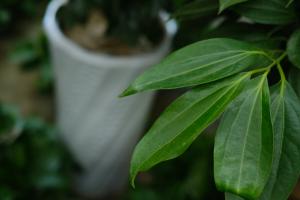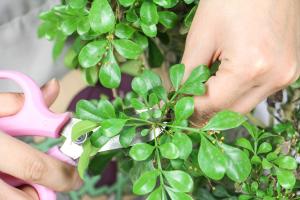How to Care for Ivy Plant Indoors
Ivy plants are popular houseplants known for their lush foliage and air-purifying qualities. However, they require some care to thrive indoors. In this article, we will discuss some tips on how to care for ivy plant indoors.
1. Watering
One of the most important things you can do to care for ivy plants is to water them correctly. Too little water can cause the leaves to wilt and fall off, while too much can lead to root rot. It is essential to water ivy plants consistently but not overwater them.
To water your ivy plant, wait until the top inch of soil is dry, and then water it until water drains out of the bottom of the pot. Make sure to empty any excess water that collects in the saucer underneath the pot. In winter, when indoor heating can dry the air, misting the leaves occasionally can help keep them hydrated.
2. Light
Ivy plants thrive in bright but indirect light. They can tolerate low light levels but will not grow as vigorously. Place your ivy plant near a window that receives indirect sunlight, or use artificial lighting if necessary. If your ivy plant gets too much direct sunlight, the leaves may scorch.
3. Temperature and Humidity
Ivy plants prefer cooler temperatures, and they can withstand temperatures as low as 45掳F. However, keep them away from drafty windows or doors. High humidity is also essential for ivy plants, so consider using a humidifier or placing a tray of water near the plant to increase the moisture in the air.
4. Fertilizing
Ivy plants benefit from regular fertilization during the growing season (spring and summer). Use a balanced fertilizer every four weeks to supply essential nutrients. Avoid fertilizing during the winter when the plant is dormant.
5. Pruning
Prune your ivy plant regularly to keep it looking healthy and bushy. Pinch back the tips of the vines to encourage branching, and remove any dead or yellowing leaves. You can also trim back the plant's size by cutting back the vines.
6. Pests
Ivy plants are generally pest-free, but they may occasionally be affected by mealybugs, spider mites, or scale insects. If you notice any of these pests on your plant, treat them with an insecticidal soap or other appropriate pesticide. Keep your ivy plant away from other plants to prevent the spread of pests.
In conclusion, caring for an ivy plant indoors requires attention to watering, light, temperature and humidity, fertilizing, pruning, and pest control. By following these tips, you can ensure that your ivy plant thrives and adds beauty to your home for years to come.

 how many times do yo...
how many times do yo... how many planted tre...
how many planted tre... how many pine trees ...
how many pine trees ... how many pecan trees...
how many pecan trees... how many plants comp...
how many plants comp... how many plants can ...
how many plants can ... how many plants and ...
how many plants and ... how many pepper plan...
how many pepper plan...






























